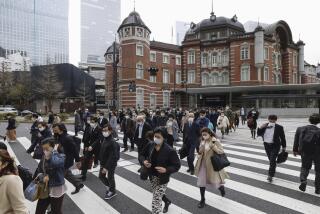Japan’s Resistance to Daylight Saving Wanes
- Share via
TOKYO -- Much of the industrialized world may have switched to daylight saving time decades ago, but it’s still seen as a radical idea by many in Japan -- and strongly resisted.
It’s not just the hassle of resetting clocks. Farmers fret that cows will be thrown off schedule and won’t give as much milk. Social critics fear that children staying up later at night will turn into delinquents.
And there are worries that Japan’s office workers, under social pressure not to leave before dark, will end up spending even more time at their jobs.
But attitudes may be changing.
The government proposed going to daylight saving time in 1998 as part of the energy-saving guidelines drafted to meet the Kyoto protocol on climate change. And daylight saving is increasingly being seen as an environmental issue.
“I think the daylight saving debate is set to become more lively,” said Satoru Matsuda, spokesman for the Environment Agency. “Private groups are starting to come together on their own to discuss it.”
Possibly the biggest obstacle has been history.
Daylight saving time was imposed in 1948 under the American occupation after Japan’s defeat in World War II, but was so unpopular that the Japanese voted it out in 1952. Its association with Japan’s postwar humiliation continued to stir up bitter opposition for years.
Matsuda says the government wants to adopt daylight saving by 2008, citing the deadline set by the Kyoto protocol under which Japan has committed to a 6% reduction in emissions of greenhouse gases.
Changing to daylight saving could save 130 million gallons of oil a year -- the equivalent of every Japanese household keeping its lights off for a month, according to a study by the Energy Conservation Center in Tokyo.
That would mean $664 million worth of annual energy savings, the study said. The figure is on par with the $600 million that Mexico says it saved since adopting daylight saving time in 1996.
Such figures are likely swaying many Japanese, whose country is poor in natural resources and dependent on oil imports.
In the most recent government poll in September 2001, 51% of respondents supported the idea. Only 29% were decidedly against it -- down markedly from the 1952 post-occupation poll, when 53% opposed it.
The main reason given for backing the change had nothing to do with recreation. Some 67% said it should be adopted to save energy, while only 45% believed that more hours of daylight in the evening would widen options for personal activities.
When asked what effects people expected daylight saving time to have, the top reasons were environmental -- from using less air conditioning to helping stop global warming. The personal benefits aren’t discounted, however.
“You wake up at 5 a.m. and it’s already very light outside -- it’s a waste of time,” said Taikan Oki, professor of environmental resources engineering at Tokyo University. If daylight saving were adopted, “it could have a real impact on people’s lives.”
For Shunji Tashiro, an employee at NEC, the issue comes down to golf: “Being able to tee up at 6 p.m. and hit a round after finishing work -- it’s really a very efficient use of daylight hours.”
Not everyone is convinced.
“It’s called ‘savings’ time, yet getting up so early for work that it’s still dark outside and turning on the lights, where’s the saving in that?” wrote a participant in a Web forum started by Tashiro.
More to Read
Sign up for Essential California
The most important California stories and recommendations in your inbox every morning.
You may occasionally receive promotional content from the Los Angeles Times.













